This topic has been sitting in my drafts since I started this blog (7 months ago). A topic I've so badly wanted to talk about but until recently haven't fought my own battles enough to write about. There's so much I could say about trust, however I think the biggest is the consuming pressure and worry over things that you either CAN'T control or SHOULDN'T be controlled. Both instilling trust in yourself and in the process can set you free from those worries and allow you to put energy towards the things in life that actually deserves your effort.
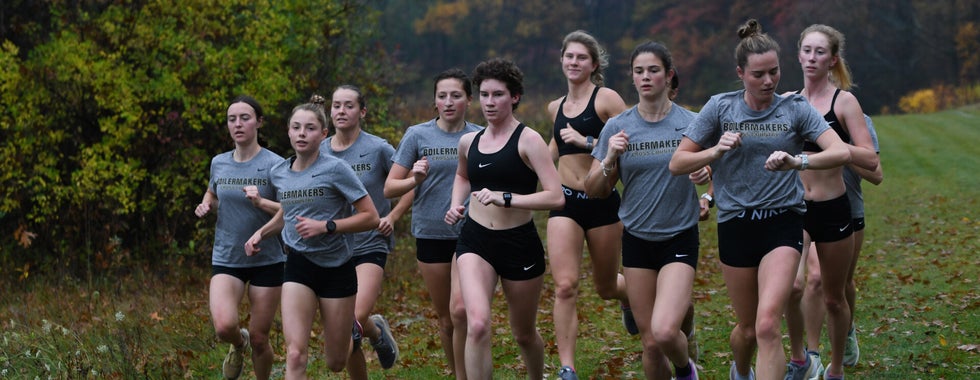
Me and trust don't get along. Specifically, trust in myself is something I've never been able to grasp and something I've spent the past few years trying to regain. I mean at one point in my life I must have been able to do it...right? So, as I've said a million times, this is a topic I've worked hard at but am still very much working on. So even if I'm writing this to share it with you, it’s as much or more a reminder to myself as well.
I think trust can be split into 2 categories. There are the things we can control but probably shouldn't and the things that are completely out of our control. Control is a WHOLE other topic that I may never fully be able to write about (another topic that's been in the drafts for months). However, the bottom line is, even if there is something we CAN control, it’s usually better left alone because the chances your actions are positively impacting you are slim (in most cases).
Trust & Food
The relationship between food, body image, and training is a big example of something...well I suppose it can go two ways. It either FEELS like controlling your food intake will help the other two when you’re not really controlling as much as you think OR you're controlling something that in perspective of your physical and mental health, it is just better left to trust.
The biggest challenge I've run into is trusting my body. Trusting that it knows how much, what, and how often to eat. However, your body is smart...miraculously, it’s actually really good at doing those things *insert blown mind emoji*.
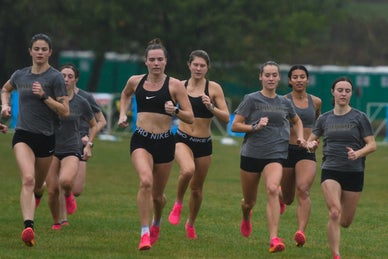
Back in high school, before I learned the caloric needs of a high-level athlete was, I found myself in an unintentional under fueling ~hole~. We know this, I've talked about it a million times before, but it left me in a place where I didn't trust my body and didn't trust it knew how much I need to eat—I mean it very well PROVED it doesn't. This left me with a rigid schedule with no room for my hunger or taste cues to work. I had to eat this this and this at these times if I wanted to be any good. And it worked, I ran well. However, the same could have been true if I made small tweaks and left the rest up to trust in my body.
On the other side of the spectrum, I spent the better half of last spring always hungry and constantly trying to keep up with these annoying incessant hunger cues by eating as much as humanly possible and still failing. We later discovered it was really some extra worry and anxiety disguising itself as hunger. So, with this new discovery: any trust I DID have? forget about it "if a stupid emotion can make up a fake hunger cue than why would I listen to my body, it’s just going to make me eat more than I need and gain weight". And this left me in an intentional under fueling ~hole~ because if my body can't tell me how much to eat then I suppose nothing matters, every hunger cue is fake, there's no reason to EVER listen.
It feels so stupid to write out those thoughts out now, like what was I ever thinking? But as we've established, I don't gain trust easily, but it doesn't take much to break it. So now that I've told the story, what did I do about it? Since both instances had extremely concrete evidence of my rationale, it was difficult to start to rebuild that confidence. If I'm being honest, I still bounce between the two of these but I'm slowly but surely distancing myself from both. The first step was to think about the reasons for these two things happening.
For the first one, I had zero knowledge of nutrition or what I needed, which meant I never ate until I was full enough or when I wasn't hungry but needed to eat anyway. Adding the knowledge of "yeah I need to eat after I run even if I'm not hungry yet" would have been literally all I needed.
For the second, there's a little more to it since, I don't think anything, or anyone had ever broken my trust quite like that. First and foremost, the reason I was getting these "fake" hunger cues was because I was so worried about food. If I was getting enough, if/how it was going to impact my performance, if it would change my weight, the list goes on. If I had been able to trust my hunger cues from the start and wasn't tangled up in the thinner is faster web of lies, then this wouldn't have been an issue. There was a point where I just didn't care about what my body was asking for, so I had to somehow get myself to care more (about eating too little) while also caring less (about eating too much). Reminding myself of the basic car analogy, "If you don't put any gas in your car how is it going to go?" helped me care a little more since I've been there before. Being in an energy deficit comes with a lot of unfun things I don't wish to revisit. I also realized I was never going to regain trust if I didn’t give myself the chance to prove it. I'm a very concrete numbers and proof type of person so I was never going to fix it if I didn't show myself, I could eat what I want, run well, not gain weight, and improve my mood.
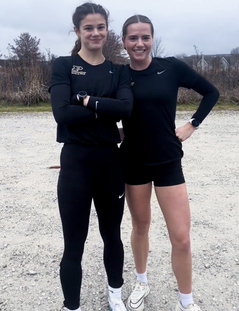
It’s so stupid that if I gave up on that one rule and allowed myself everything I wanted, those 3 worries all go away together. We did a bunch of blind weights during this time, I have no idea what the numbers were but I do know the number continued to ebb and flow between a 10 pound range regardless of if I felt like I was eating way too much. During this time, I also miraculously started running well. I had the energy to finish a workout AND a full day of school and social activities. Seemed like magic in the moment but it all makes sense. Once I started to see these things prove themselves, my worries didn't have much room to stand and naturally I started to gain a little bit of trust in myself. It turns out if I trust my body, I'll be less worried, which will allow my hunger cues to work better, which will help me trust them, which will make me run faster, and won't make me gain weight.
*insert a really big blown mind emoji*
Trust & Training
For this one, I feel like my perspective is a little skewed since I just went through such a long PR dry spell which has made me question the past few years of training. However, after some deep thought, I think I've learned a lot about this topic that I feel is still helpful and important. The line that sums up this entire section is "Trust the process" I mean duh, everyone knows that, but how do you do that when you hit bumps in the road and aren't progressing as you expect?
There are two different responses you can have to a stalled progression. You can panic, be really hard on yourself, nitpick your lifestyle and cut out everything that isn't conducive to a successful runner. Or you can take a deep breath, give yourself grace, understand why you are where you're at, and get excited for the path in front of you.
I've obviously done the whole "panic, change your lifestyle" thing. We've established that. I go wayyyy more in depth to that and stalled progress is a blog I wrote this summer if you want to see that, I think it has some really good points if this is
something that you're experiencing. ->
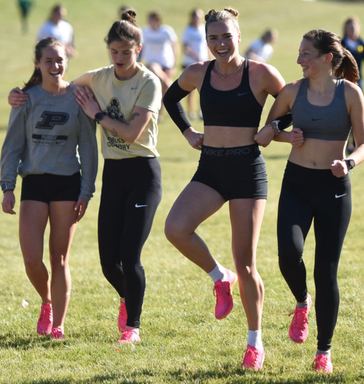
Anyways back to the trust part. The point I made in the introduction of this post is the most important part. "I think the biggest is the consuming pressure and worry over things that you either CAN'T control or SHOULDN'T be controlled". I might add this is applicable for one single bad race or workout to months of no progress. When you panic and stop trusting your training because "it's not working" puts more pressure on yourself, takes the fun out of the sport, and most importantly: will almost for sure make you perform worse. This can turn one bad workout into months of bad races or years of stalled progress and no PRs. Doesn't that suck? It's all related, which leads to a fast downward spiral. The bright side? If you figure this out, it's not entirely difficult to fix. So long story short, I think I fell into this spiral last year and... well that wasn't fun for anybody. I expected so much out of myself, and I wasn't anywhere near those expectations. I tried to double down on my sleep, do every little thing right, and yeah basically take the fun out of the sport. I tried to control the incontrollable and tried to control the things not worth controlling.
This obviously wasn't working. I will say, I told my plan to my therapist basically saying, "we're changing everything this summer" to that she replied, "Wow that sounds like a lot of pressure, not a very relaxing summer". So yeah, I mean she's right so with some ~minor~ tweaks, I went into summer training with a changed mindset, made small goals, had fun, enjoyed the process, and didn't make running the center of my life. I knew that if I had any hope at turning this around, I had to sit back, do what was on the training sheet, put in the miles, and not think about it too hard. Now this isn't to say I stopped caring about running, but I took the pressure off by fitting my runs around my life a little more than my life around my runs. Being a distance runner, summer is our only "off-season" in quotes because the summer is seen as the place you build all your fitness, run the most amount of miles, and train like a "professional athlete" because you don't have school to go to. Obviously, summer training is really difficult, you’re alone, hitting new mileage goals, and worst of all running in the heat *ew*. So, with that said, physically summer is the same as the rest of the year, but I gave my brain that off-season to relax, destress, and gear up for the year ahead. I followed what was on the sheet, put all my effort into my runs, then most importantly: lived my life when I wasn't putting in the miles.
I came out of summer break proud of the miles I had put in and even more memories I had made of allowing myself to enjoy everything else. I came into cross country more ready than any other season I'd run in college thus far. I will say I wished for more out of this fall, but I didn't let my performance change my mindset. We had a lot of changes, a new coach, started lifting, more intense workouts. I knew this would impact me, so I gave myself grace and waited for myself to adapt to this new training because I knew the results were going to come at some point. Patience is definitely the hardest part about trust, but putting things into perspective and enjoying the process makes it just a little bit easier.
So now I want to attempt to put that whole story into advice that is actually applicable, specifically to this time of year. If you're in high school/middle school/redshirting and without an indoor schedule or a very small one, this is a great time to stay patient and trust your training so you'll be sooooo ready for outdoor. As for us who have 4-5 months of racing ahead of us...well I haven't really figured that part out yet. However, I think learning to completely separate sport from life allows the stress of season to limit its time in my brain. The goal for longevity and love for the sport comes from keeping the joy and limiting the stress and pressure it brings.
Now obviously, I'm writing this approximately 7 days after my first substantial PR in two years. So yeah, I could totally talk it down to a lucky race or nitpick the little things I did right the day before, but we're not going to think about that. To be honest I'm a little nervous going into the next race because I know what I'm capable of and expect a lot out of myself. However, putting that pressure on myself won't do any good. I'm better off, showing up to practice, putting in the work, and getting excited for another opportunity to see what I can do. After all, a race is just a fun way to see what you’re capable of. There's no reason to put unnecessary pressure when it’s better off left to trust anyway.
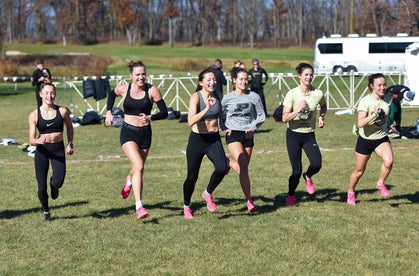
Add comment
Comments